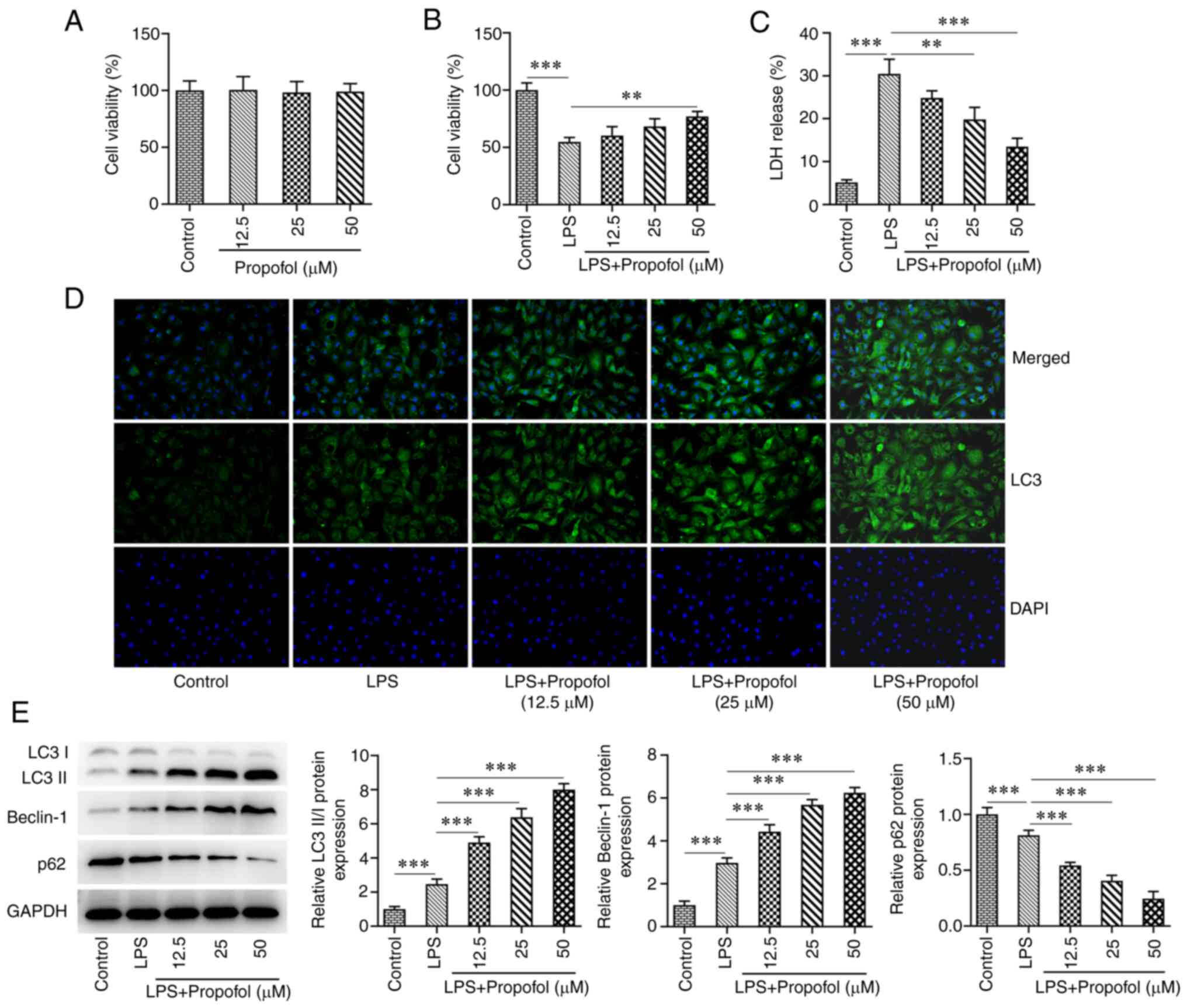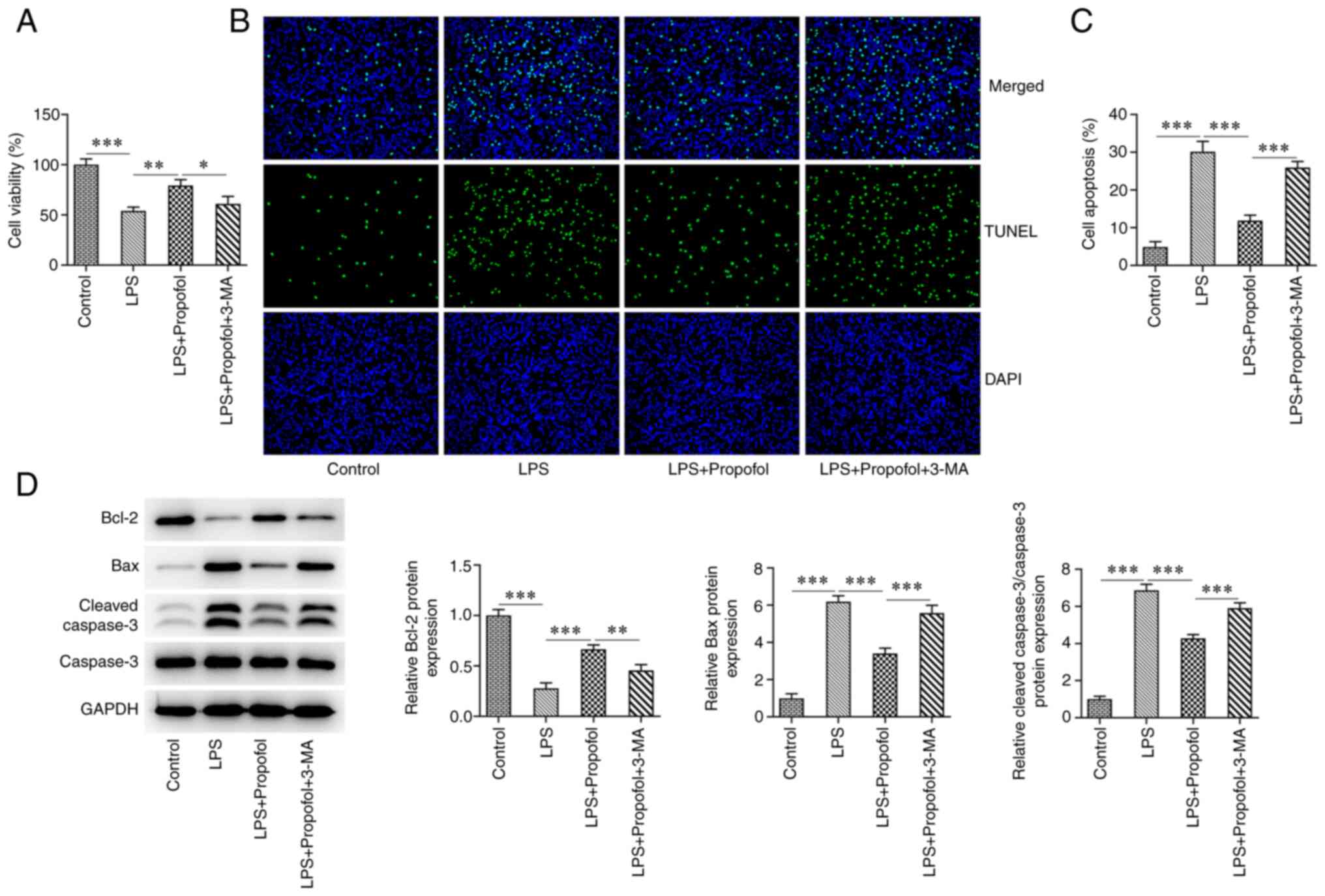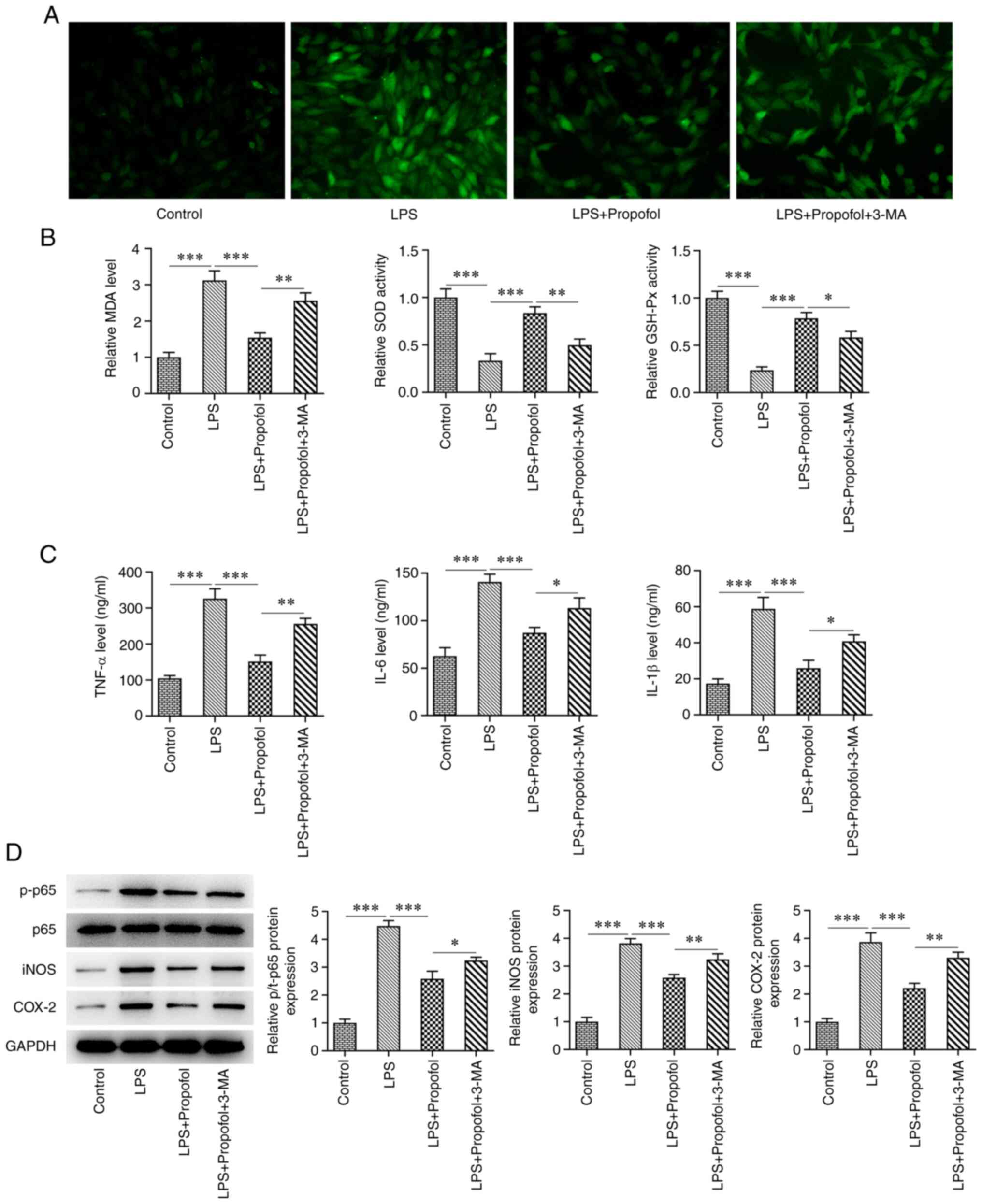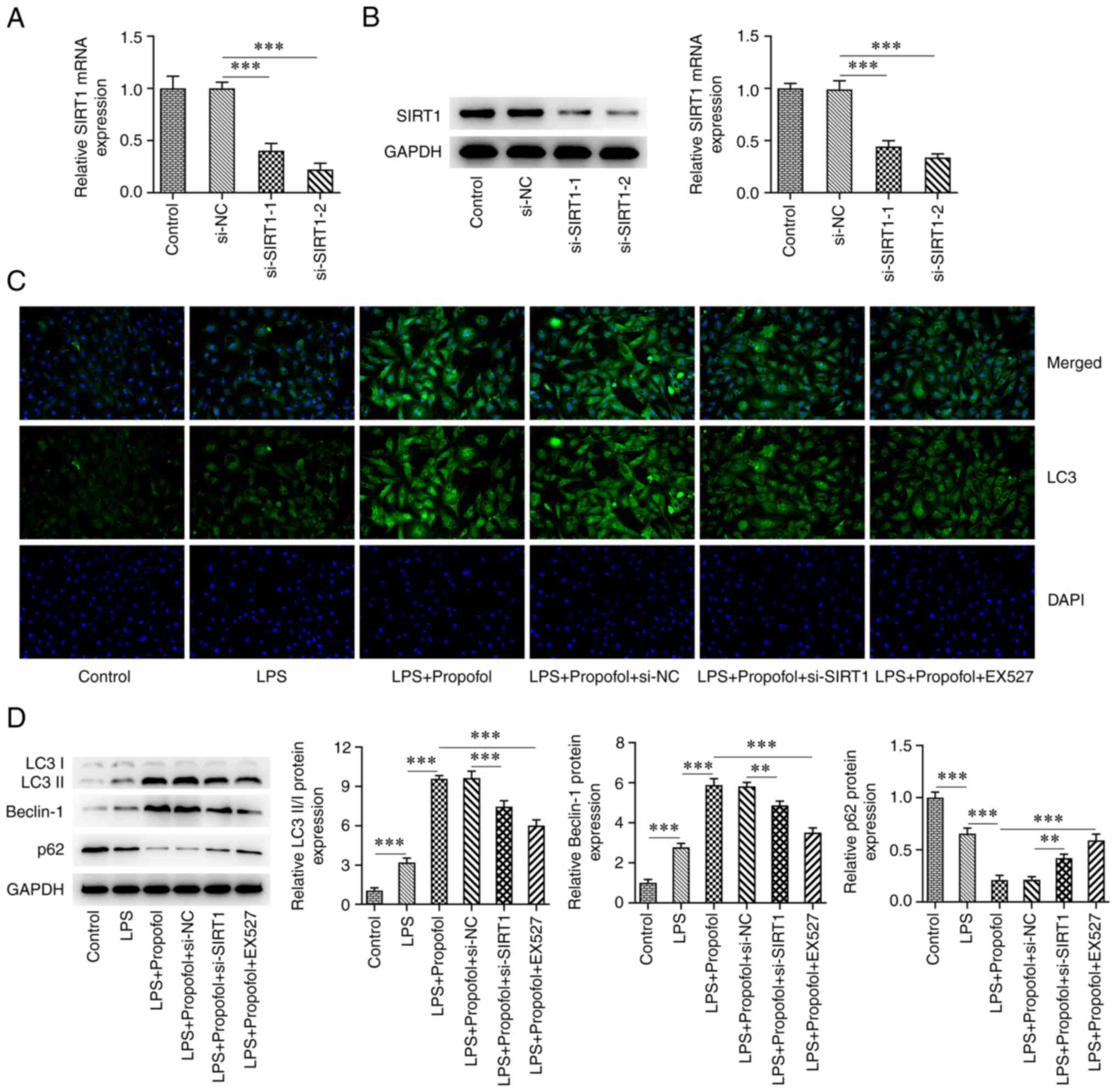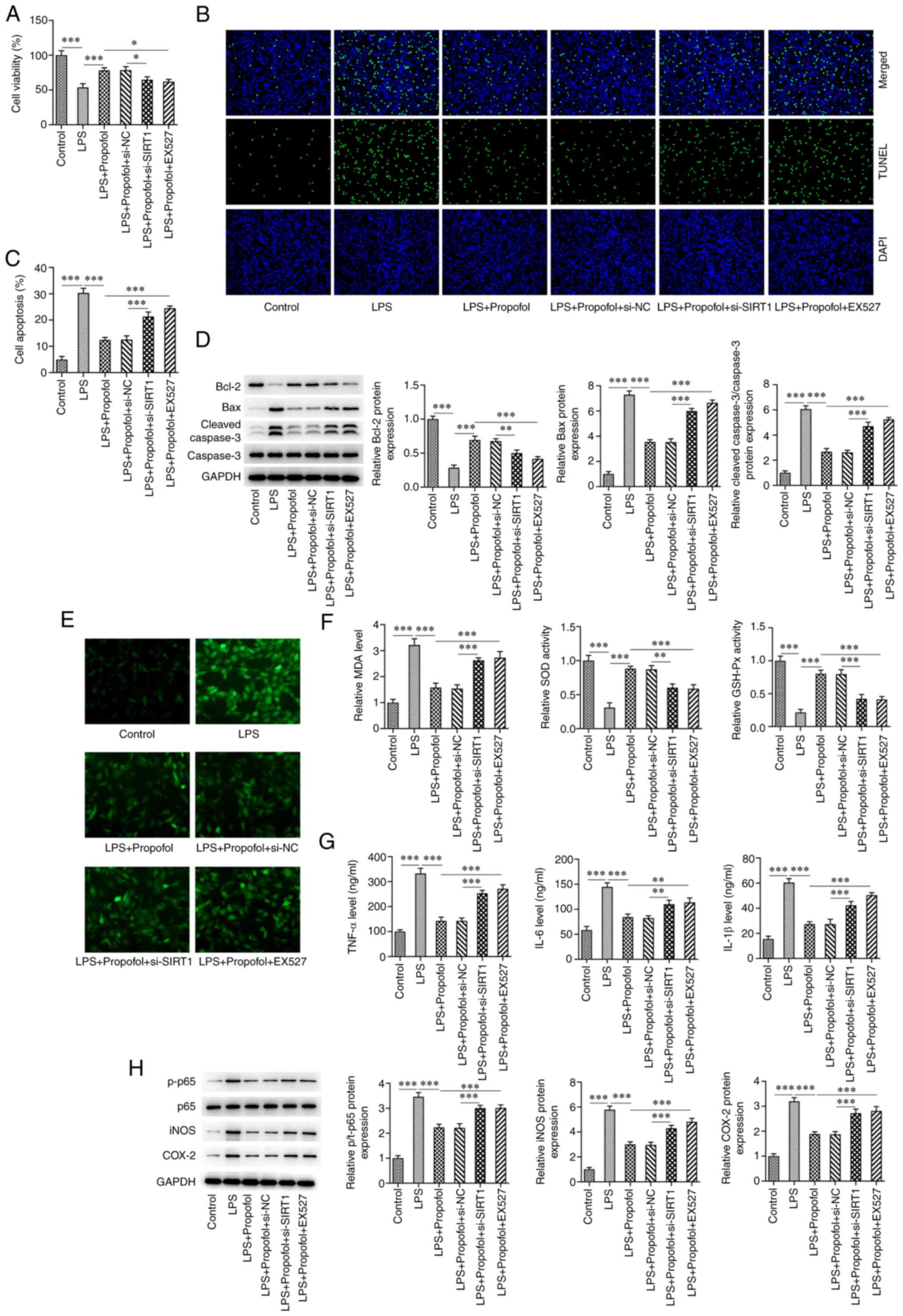|
1
|
Merx MW and Weber C: Sepsis and the heart.
Circulation. 116:793–802. 2007.PubMed/NCBI View Article : Google Scholar
|
|
2
|
Romero-Bermejo FJ, Ruiz-Bailen M,
Gil-Cebrian J and Huertos-Ranchal MJ: Sepsis-induced
cardiomyopathy. Curr Cardiol Rev. 7:163–183. 2011.PubMed/NCBI View Article : Google Scholar
|
|
3
|
Fan W, Zhu X, Wu L, Wu Z, Li D, Huang F
and He H: Propofol: An anesthetic possessing neuroprotective
effects. Eur Rev Med Pharmacol Sci. 19:1520–1529. 2015.PubMed/NCBI
|
|
4
|
Li YM, Sun JG, Hu LH, Ma XC, Zhou G and
Huang XZ: Propofol-mediated cardioprotection dependent of
microRNA-451/HMGB1 against myocardial ischemia-reperfusion injury.
J Cell Physiol. 234:23289–23301. 2019.PubMed/NCBI View Article : Google Scholar
|
|
5
|
Lai HC, Yeh YC, Wang LC, Ting CT, Lee WL,
Lee HW, Wang KY, Wu A, Su CS and Liu TJ: Propofol ameliorates
doxorubicin-induced oxidative stress and cellular apoptosis in rat
cardiomyocytes. Toxicol Appl Pharmacol. 257:437–448.
2011.PubMed/NCBI View Article : Google Scholar
|
|
6
|
Lu Z, Liu Z and Fang B: Propofol protects
cardiomyocytes from doxorubicin-induced toxic injury by activating
the nuclear factor erythroid 2-related factor 2/glutathione
peroxidase 4 signaling pathways. Bioengineered. 13:9145–9155.
2022.PubMed/NCBI View Article : Google Scholar
|
|
7
|
Bao HG and Li S: Effects of propofol on
the outcomes of rats with sepsis. J Surg Res. 168:e111–e115.
2011.PubMed/NCBI View Article : Google Scholar
|
|
8
|
Zhao H, Gu Y and Chen H: Propofol
ameliorates endotoxininduced myocardial cell injury by inhibiting
inflammation and apoptosis via the PPARgamma/HMGB1/NLRP3 axis. Mol
Med Rep. 23(176)2021.PubMed/NCBI View Article : Google Scholar
|
|
9
|
Liu Z, Meng Y, Miao Y, Yu L and Yu Q:
Propofol reduces renal ischemia/reperfusion-induced acute lung
injury by stimulating sirtuin 1 and inhibiting pyroptosis. Aging
(Albany NY). 13:865–876. 2020.PubMed/NCBI View Article : Google Scholar
|
|
10
|
Liu Y, Du X, Zhang S, Liu X and Xu G:
Propofol alleviates hepatic ischemia/reperfusion injury via the
activation of the Sirt1 pathway. Int J Clin Exp Pathol.
10:10959–10968. 2017.PubMed/NCBI
|
|
11
|
Wang J, Qi J, Wu Q, Jiang H, Yin Y, Huan
Y, Zhao Y and Zhu M: Propofol attenuates high glucose-induced
P66shc expression in human umbilical vein endothelial cells through
Sirt1. Acta Biochim Biophys Sin (Shanghai). 51:197–203.
2019.PubMed/NCBI View Article : Google Scholar
|
|
12
|
Wang L, Xu C, Johansen T, Berger SL and
Dou Z: SIRT1-a new mammalian substrate of nuclear autophagy.
Autophagy. 17:593–595. 2021.PubMed/NCBI View Article : Google Scholar
|
|
13
|
Luo G, Jian Z, Zhu Y, Zhu Y, Chen B, Ma R,
Tang F and Xiao Y: Sirt1 promotes autophagy and inhibits apoptosis
to protect cardiomyocytes from hypoxic stress. Int J Mol Med.
43:2033–2043. 2019.PubMed/NCBI View Article : Google Scholar
|
|
14
|
Zhang WX, He BM, Wu Y, Qiao JF and Peng
ZY: Melatonin protects against sepsis-induced cardiac dysfunction
by regulating apoptosis and autophagy via activation of SIRT1 in
mice. Life Sci. 217:8–15. 2019.PubMed/NCBI View Article : Google Scholar
|
|
15
|
Guo XN and Ma X: The effects of propofol
on autophagy. DNA Cell Biol. 39:197–209. 2020.PubMed/NCBI View Article : Google Scholar
|
|
16
|
Wang Y, Yu W, Shi C and Hu P: Crocetin
attenuates sepsis-induced cardiac dysfunction via regulation of
inflammatory response and mitochondrial function. Front Physiol.
11(514)2020.PubMed/NCBI View Article : Google Scholar
|
|
17
|
Tang J, Hu JJ, Lu CH, Liang JN, Xiao JF,
Liu YT, Lin CS and Qin ZS: Propofol inhibits
lipopolysaccharide-induced tumor necrosis factor-alpha expression
and myocardial depression through decreasing the generation of
superoxide anion in cardiomyocytes. Oxid Med Cell Longev.
2014(157376)2014.PubMed/NCBI View Article : Google Scholar
|
|
18
|
Yuan X, Chen G, Guo D, Xu L and Gu Y:
Polydatin alleviates septic myocardial injury by promoting
SIRT6-mediated autophagy. Inflammation. 43:785–795. 2020.PubMed/NCBI View Article : Google Scholar
|
|
19
|
Xu C, Xiao Z, Wu H, Zhou G, He D, Chang Y,
Li Y, Wang G and Xie M: BDMC protects AD in vitro via AMPK and
SIRT1. Transl Neurosci. 11:319–327. 2020.PubMed/NCBI View Article : Google Scholar
|
|
20
|
Livak KJ and Schmittgen TD: Analysis of
relative gene expression data using real-time quantitative PCR and
the 2(-Delta Delta C(T)) method. Methods. 25:402–408.
2001.PubMed/NCBI View Article : Google Scholar
|
|
21
|
Lv X and Wang H: Pathophysiology of
sepsis-induced myocardial dysfunction. Mil Med Res.
3(30)2016.PubMed/NCBI View Article : Google Scholar
|
|
22
|
Giordano NP, Cian MB and Dalebroux ZD:
Outer membrane lipid secretion and the innate immune response to
gram-negative bacteria. Infect Immun. 88:e00920–19. 2020.PubMed/NCBI View Article : Google Scholar
|
|
23
|
Abel FL: Myocardial function in sepsis and
endotoxin shock. Am J Physiol. 257:R1265–R1281. 1989.PubMed/NCBI View Article : Google Scholar
|
|
24
|
Norouzi F, Abareshi A, Asgharzadeh F,
Beheshti F, Hosseini M, Farzadnia M and Khazaei M: The effect of
Nigella sativa on inflammation-induced myocardial fibrosis in male
rats. Res Pharm Sci. 12:74–81. 2017.PubMed/NCBI View Article : Google Scholar
|
|
25
|
Tung CL, Ju DT, Velmurugan BK, Ban B, Dung
TD, Hsieh DJ, P Viswanadha V, Day CH, Lin YM and Huang CY:
Carthamus tinctorius L. extract activates insulin-like growth
factor-I receptor signaling to inhibit FAS-death receptor pathway
and suppress lipopolysaccharides-induced H9c2 cardiomyoblast cell
apoptosis. Environ Toxicol. 34:1320–1328. 2019.PubMed/NCBI View Article : Google Scholar
|
|
26
|
Snezhkina AV, Kudryavtseva AV, Kardymon
OL, Savvateeva MV, Melnikova NV, Krasnov GS and Dmitriev AA: ROS
Generation and antioxidant defense systems in normal and malignant
cells. Oxid Med Cell Longev. 2019(6175804)2019.PubMed/NCBI View Article : Google Scholar
|
|
27
|
Tsikas D: Assessment of lipid peroxidation
by measuring malondialdehyde (MDA) and relatives in biological
samples: Analytical and biological challenges. Anal Biochem.
524:13–30. 2017.PubMed/NCBI View Article : Google Scholar
|
|
28
|
Diaz-Vivancos P, de Simone A, Kiddle G and
Foyer CH: Glutathione-linking cell proliferation to oxidative
stress. Free Radic Biol Med. 89:1154–1164. 2015.PubMed/NCBI View Article : Google Scholar
|
|
29
|
Han B, Lv Z, Zhang X, Lv Y, Li S, Wu P,
Yang Q, Li J, Qu B and Zhang Z: Deltamethrin induces liver fibrosis
in quails via activation of the TGF-β1/Smad signaling pathway.
Environ Pollut. 259(113870)2020.PubMed/NCBI View Article : Google Scholar
|
|
30
|
Yang X, Fang Y, Hou J, Wang X, Li J, Li S,
Zheng X, Liu Y and Zhang Z: The heart as a target for deltamethrin
toxicity: Inhibition of Nrf2/HO-1 pathway induces oxidative stress
and results in inflammation and apoptosis. Chemosphere.
300(134479)2022.PubMed/NCBI View Article : Google Scholar
|
|
31
|
Jang DI, Lee AH, Shin HY, Song HR, Park
JH, Kang TB, Lee SR and Yang SH: The role of tumor necrosis factor
alpha (TNF-α) in autoimmune disease and current TNF-α inhibitors in
therapeutics. Int J Mol Sci. 22(2719)2021.PubMed/NCBI View Article : Google Scholar
|
|
32
|
Li J, Yu Z, Han B, Li S, Lv Y, Wang X,
Yang Q, Wu P, Liao Y, Qu B and Zhang Z: Activation of the GPX4/TLR4
signaling pathway participates in the alleviation of selenium yeast
on deltamethrin-provoked cerebrum injury in quails. Mol Neurobiol.
59:2946–2961. 2022.PubMed/NCBI View Article : Google Scholar
|
|
33
|
Galluzzi L and Green DR:
Autophagy-independent functions of the autophagy machinery. Cell.
177:1682–1699. 2019.PubMed/NCBI View Article : Google Scholar
|
|
34
|
Onorati AV, Dyczynski M, Ojha R and
Amaravadi RK: Targeting autophagy in cancer. Cancer. 124:3307–3318.
2018.PubMed/NCBI View Article : Google Scholar
|
|
35
|
Yin X, Xin H, Mao S, Wu G and Guo L: The
role of autophagy in sepsis: Protection and injury to organs. Front
Physiol. 10(1071)2019.PubMed/NCBI View Article : Google Scholar
|
|
36
|
Liu F, Nie C, Zhao N, Wang Y, Liu Y, Li Y,
Zeng Z, Ding C, Shao Q, Qing C, et al: MiR-155 alleviates septic
lung injury by inducing autophagy via inhibition of transforming
growth factor-β-activated binding protein 2. Shock. 48:61–68.
2017.PubMed/NCBI View Article : Google Scholar
|
|
37
|
Xie M, Morales CR, Lavandero S and Hill
JA: Tuning flux: Autophagy as a target of heart disease therapy.
Curr Opin Cardiol. 26:216–222. 2011.PubMed/NCBI View Article : Google Scholar
|
|
38
|
Shi X, Liu Y, Zhang D and Xiao D: Valproic
acid attenuates sepsis-induced myocardial dysfunction in rats by
accelerating autophagy through the PTEN/AKT/mTOR pathway. Life Sci.
232(116613)2019.PubMed/NCBI View Article : Google Scholar
|
|
39
|
Pan P, Zhang H, Su L, Wang X and Liu D:
Melatonin balance the autophagy and apoptosis by regulating UCP2 in
the LPS-induced cardiomyopathy. Molecules. 23(675)2018.PubMed/NCBI View Article : Google Scholar
|
|
40
|
Unuma K, Aki T, Funakoshi T, Yoshida K and
Uemura K: Cobalt protoporphyrin accelerates TFEB activation and
lysosome reformation during LPS-induced septic insults in the rat
heart. PLoS One. 8(e56526)2013.PubMed/NCBI View Article : Google Scholar
|
|
41
|
Sun B, Ou H, Ren F, Huan Y, Zhong T, Gao M
and Cai H: Propofol inhibited autophagy through
Ca2+/CaMKKβ/AMPK/mTOR pathway in OGD/R-induced neuron
injury. Mol Med. 24(58)2018.PubMed/NCBI View Article : Google Scholar
|
|
42
|
Li H, Zhang X, Tan J, Sun L, Xu LH, Jiang
YG, Lou JS, Shi XY and Mi WD: Propofol postconditioning protects
H9c2 cells from hypoxia/reoxygenation injury by inducing autophagy
via the SAPK/JNK pathway. Mol Med Rep. 17:4573–4580.
2018.PubMed/NCBI View Article : Google Scholar
|
|
43
|
Li S, Wu P, Han B, Yang Q, Wang X, Li J,
Deng N, Han B, Liao Y, Liu Y and Zhang Z: Deltamethrin induces
apoptosis in cerebrum neurons of quail via promoting endoplasmic
reticulum stress and mitochondrial dysfunction. Environ Toxicol.
37:2033–2043. 2022.PubMed/NCBI View Article : Google Scholar
|
|
44
|
Liu XB, Xia H, Wang G, Zhang W, Hu Y and
Zhang J: Propofol relieves oxidative stress response of cerebral
ischemiareperfusion injury through SIRT1 signaling pathway. J Biol
Regul Homeost Agents. 34:435–443. 2020.PubMed/NCBI View Article : Google Scholar
|
|
45
|
Liu Z, Li C, Li Y, Yu L and Qu M: Propofol
reduces renal ischemia reperfusion-mediated necroptosis by
up-regulation of SIRT1 in rats. Inflammation. 45:2038–2051.
2022.PubMed/NCBI View Article : Google Scholar
|
|
46
|
Sun X, Han Y, Dong C, Qu H, Yu Y, Ju J,
Bai Y and Yang B: Daming capsule protects against myocardial
infarction by promoting mitophagy via the SIRT1/AMPK signaling
pathway. Biomed Pharmacother. 151(113162)2022.PubMed/NCBI View Article : Google Scholar
|
|
47
|
Chang X, Zhang T, Meng Q, ShiyuanWang Yan
P, Wang X, Luo D, Zhou X and Ji R: Quercetin improves cardiomyocyte
vulnerability to hypoxia by regulating SIRT1/TMBIM6-related
mitophagy and endoplasmic reticulum stress. Oxid Med Cell Longev.
2021(5529913)2021.PubMed/NCBI View Article : Google Scholar
|















